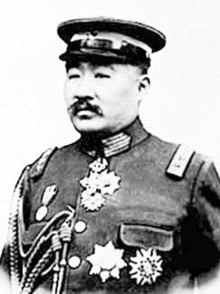Zhou Ziqi
| Zhou Ziqi 周自齊 |
|
|---|---|
 |
|
|
President of the Republic of China (Acting) |
|
|
In office 2 June 1922 – 11 June 1922 |
|
| Preceded by | Xu Shichang |
| Succeeded by | Li Yuanhong |
| Personal details | |
| Born |
November 17, 1869 Guangdong, Qing Dynasty |
| Died | October 21, 1923 (aged 53) |
| Nationality | China |
| Political party | Non-partisan |
| Other political affiliations |
Progressive Party |
Zhou Ziqi (Chinese: 周自齊; pinyin: Zhōu Zìqí; Wade–Giles: Chow Tzu-ch'i; 17 November 1869 – 21 October 1923) was a Chinese politician in the late Qing dynasty and early republican period. He was a member of the Communications Clique.
He was born in Guangdong and spoke both Cantonese and Mandarin but he later moved back to his ancestral province of Shandong. He received higher education in the United States at Columbia University. Upon returning to China, he founded Tsinghua University for the purpose of preparing students (in English and science and math) to study in America, while he was in charge of sending students to study in America. He also served as president of the university in 1911.
As the governor of Shandong Province, he supported Yuan Shikai to reverse China from a (people-governing) republic to an empire (monarch) because he believed that the Chinese people, with 98% illiteracy, were not ready to govern themselves. They could only be manipulated by politicians and bring instability and chaos to the country. He later held the following positions: President of Bank of China, Minister of Communication, Minister of Military, Minister of Finance, Minister of Agriculture and Commerce, and the Inspector General of Salt.
He helped leak information about Twenty-One Demands of the Empire of Japan to the media. Zhou may have invited Columbia University political scientist Frank Johnson Goodnow to justify monarchism for China.
During Yuan's monarchic attempt, he was sent to Japan as a special envoy. The Japanese government under Okuma Shigenobu rejected him and he returned to tell Yuan that his government lost foreign support. In 1916, Zhou fled to Japan after President Li Yuanhong ordered the arrest of Yuan's eight top monarchists. He returned to China after the charges were dropped in February 1918.
...
Wikipedia
